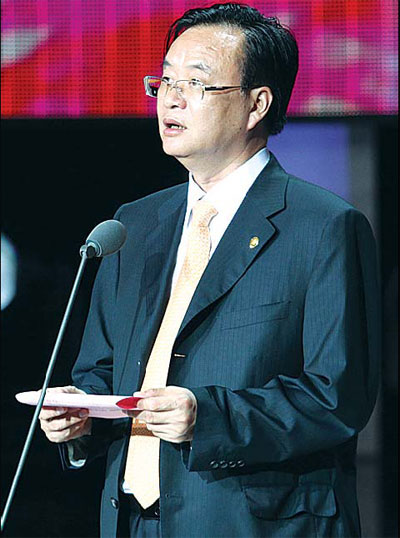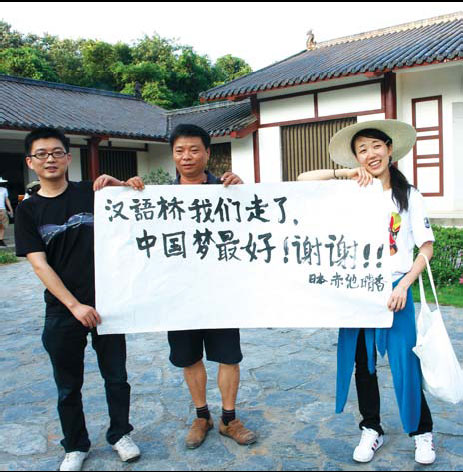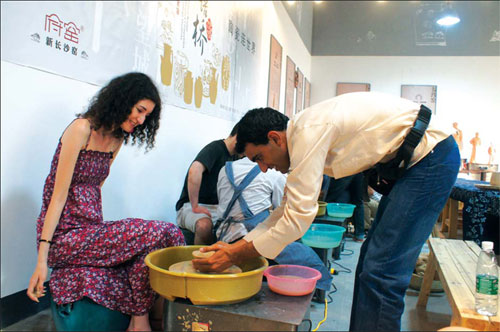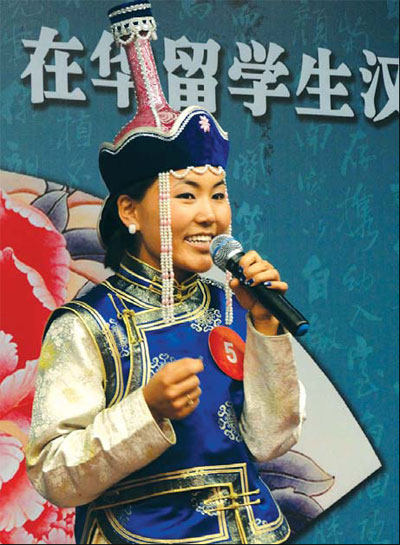
Dressed in colorful costume, foreign students get ready for the gala.

Sun Jio from South Korea beats all the rivals to become the champion of the event.

Li Youzhi, deputy governor of Hunan, said the event is 'a gala for the exchange of languages, cultures and souls'.

A Japanese student expresses her best regards to the Chinese Bridge event with carefully hand- written calligraphy.

Contestants visit Tongguan Kiln Park and try their hands at pottery making. Photos provided to China Daily

Mongolian student Gantsooj Jamiyandorj recites a poem by Yu Kwang-chung on homesickness.
Students from overseas that competed in the finals of the largest Chinese language contest gained a valuable insight into local life and culture. Li Fusheng and Feng Zhiwei report.
Local residents in Changsha might have encountered many foreigners speaking fluent Mandarin recently, as a large Chinese-language contest for non-native speakers was held in the city from July 2 through 25.
One hundred and seventy foreign college students, who had already beaten thousands of competitors in the preliminary rounds, gathered in the provincial capital of Central China's Hunan province to compete in the semi-final and final of the 11th Chinese Bridge.
The annual event, organized by the Chinese National Office for Teaching Chinese as a Foreign Language - which is colloquially known as Hanban - and the Hunan provincial government, had "My Chinese Dream" as its theme this year.
Dream chasers
Among those who harbor a Chinese dream is Alec Odahara, a 22-year old man of English and Japanese descent born in London.
Odahara has already gained some popularity in China thanks to his role in a 100-episode Chinese teaching program broadcast by CCTV, China's leading television broadcaster, in 2010.
Due to his fluent Chinese, he was invited by the Chinese embassy in the United Kingdom to serve as the emcee of the Spring Festival gala held at London's Trafalgar Square for Chinese people living in the country in February 2011.
But forTatiana Karpova from Russia it required a great deal of courage to chase her China dream.
Due to two traffic accidents in her childhood, Karpova has a fear of traveling.
However, with the encouragement of her Chinese boyfriend, who promised to take her to see pandas after the competition, Karpova overcame her fear.
The trip took her four days and nights by train from Ekaterinburg to Beijing and then to Changsha.
Karpova, who said she is quite shy, never thought she would one day say tongue twwwisters and sing popular songs in Mandarin in public.
But she said it has helped restore her confidence and she has made many friends.
Gantsooj Jamiyandorj, a Mongolian student, dreams of becoming a Chinese teacher in her home country so that she can help more people to experience the charm of the language.
Jamiyandorj said she did not begin learning Chinese until she was enrolled as a student majoring in Mongolian and Chinese studies in the National University of Mongolia.
Despite the fact that she found the language difficult at first, she soon found its beauty in Chinese literature, especially poetry.
Now a student studying in Hunan University, Jamiyandorj said she would recite Li Bai's In a Quite Night, a well-known poem on homesickness in China, as she misses her family back in Mongolia.
She won the preliminary rounds by reciting a poem on the same topic by Yu Kwang-chung, a modern Chinese poet living in Taiwan.
Besides their language proficiency, contestants also impressed the panel of judges by their skillful use of online buzz words.
"They are quite familiar with popular words on the Internet, and this indicates they are closely following the development of Mandarin," said Hai Xia, a CCTV news anchor.
While displaying their understanding of the Chinese language and culture, the contestants at the event have also showed their unique skills and experiences.
Mannakee Samuel Joseph is from London. This handsome young man impressed the audience with his guitar performance.
Wanjiku Anthony Ndugi from Kenya is a tough guy. He said he once killed a lion as it was trying to attack him when he was a teenager.
Singaporean Lim Boon Khai performed a traditional Chinese game called diabolo. Stadlin-Rob bie Asher from New Zealand spoke Cantonese fluently. Australia's Blackie Andrew Stack spoke Changsha dialect fluently and said he is a good mahjong player. Benyomo Marie Murielle from Cameroon displayed his love of Peking Opera...
Local flavors
The competition also offered contestants opportunities to visit local families and see their daily lives.
McMahon Benjamin Jesse, a contestant from Australia, paid a visit to a local family fond of cooking, where he tasted a variety of Chinese dishes.
Puzzled why the local cuisine features red peppers so heavily, he was told that the color red has auspicious meanings in China and peppers aid digestion in Hunan's humid climate.
Ratsizakaina Isaia Herimialy from Madagascar visited a household of the Miao ethnic group living in western Hunan.
The girl was greeted by the host family at the door and offered a bowl of rice wine, a local way to show respect for guests.
She also learnt the Miao-style hand-waving dance from the hostess during her brief stay.
Impressed by the family's hospitality, Herimialy said she now has a deeper understanding of the Miao people and their traditions.
More than 50 contestants also visited the Tongguan Kiln Park, a national archaeological site.
The park, covering 300,000 square meters, has the remains of 19 kilns that were used to make colorful porcelain in the Tang Dynasty (AD 618-907).
The cluster of kilns reached their peak in the mid-ninth century, and their products might have been sold to Africa, a tour guide told the contestants.
The students were also amazed at the large variety of fine porcelain that had been unearthed at the site.
"It is really a phenomenal feat for the ancient Chinese to make such fine things without complex machinery and the Internet," said Hbous Hassan from the Ukraine.
Yeo Kyeong-koo, a college student from South Korea, even tried his hand at pottery making during the visit.
"It is much more difficult than I imagined," Yeo said, adding that the experience has enriched his knowledge of ancient Chinese people's wisdom.
Yeo said that the competition has been a very rewarding experience and he has met many friends who are also "big fans of the Chinese language and culture".
More than 700 college students from over 60 countries have participated in the semi-finals and finals since it was launched in 2002. Tens of thousands more have taken part in the preliminary contests in their own countries.
Changsha has hosted the event since 2008.
Contact the writers at lifusheng@chinadaily.com.cn
来源:中国日报 编辑:文新征
